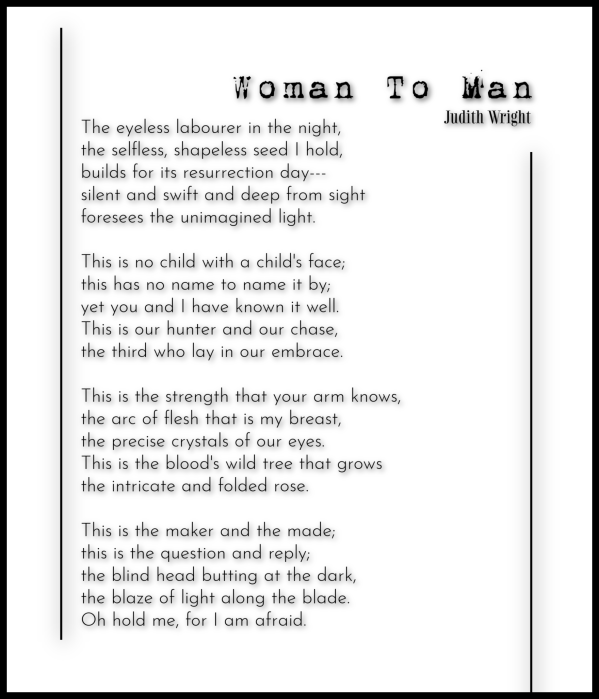
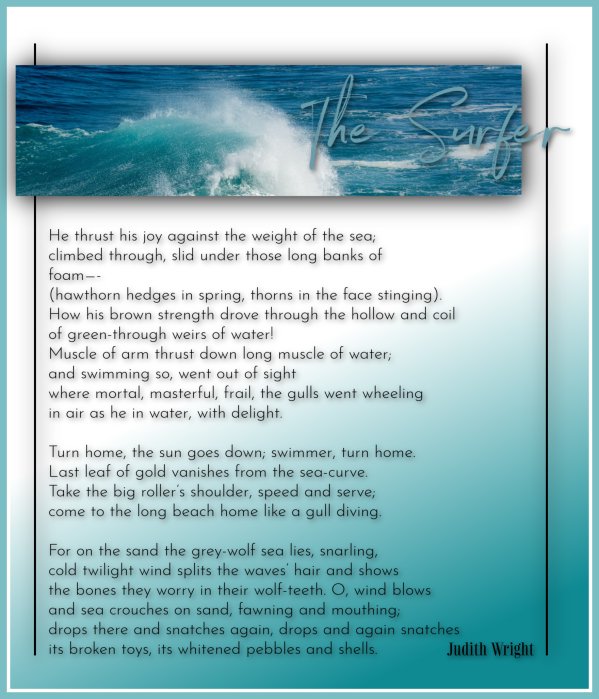
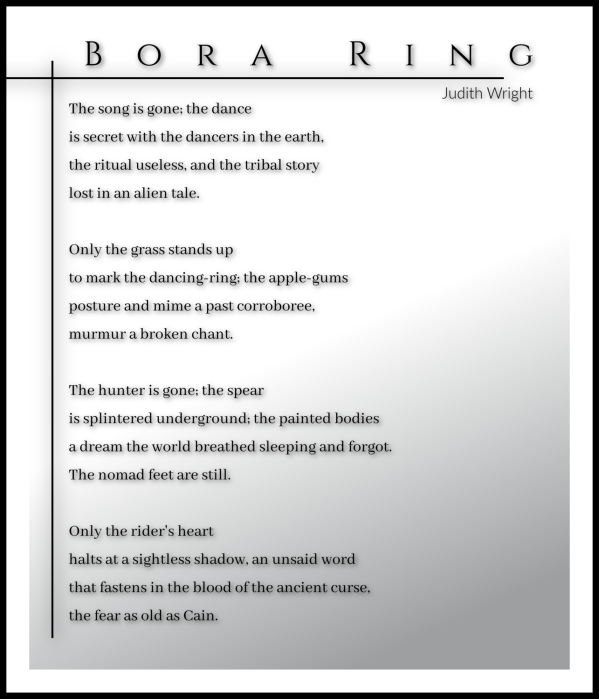
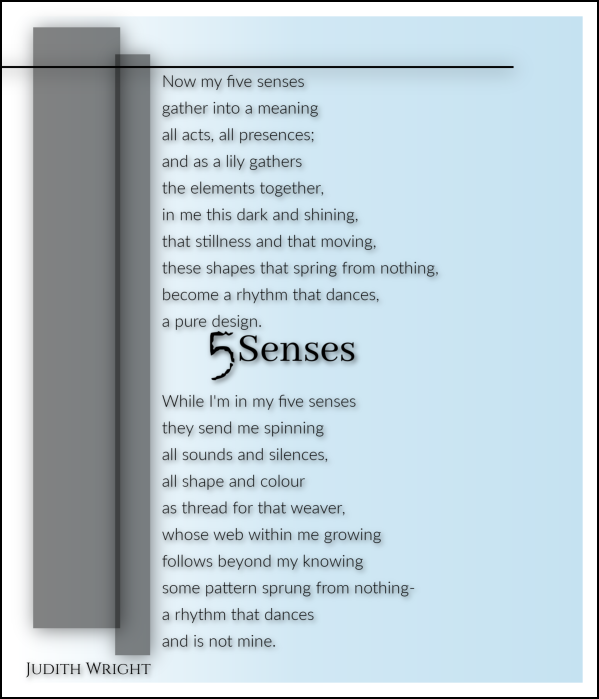
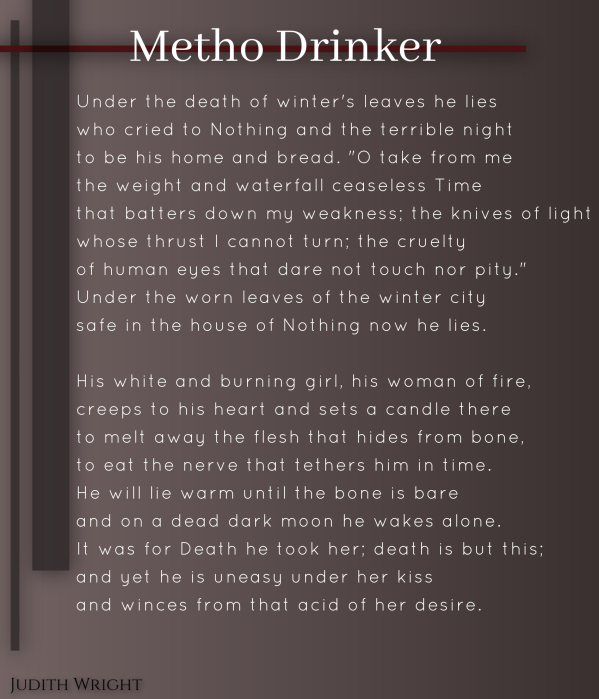
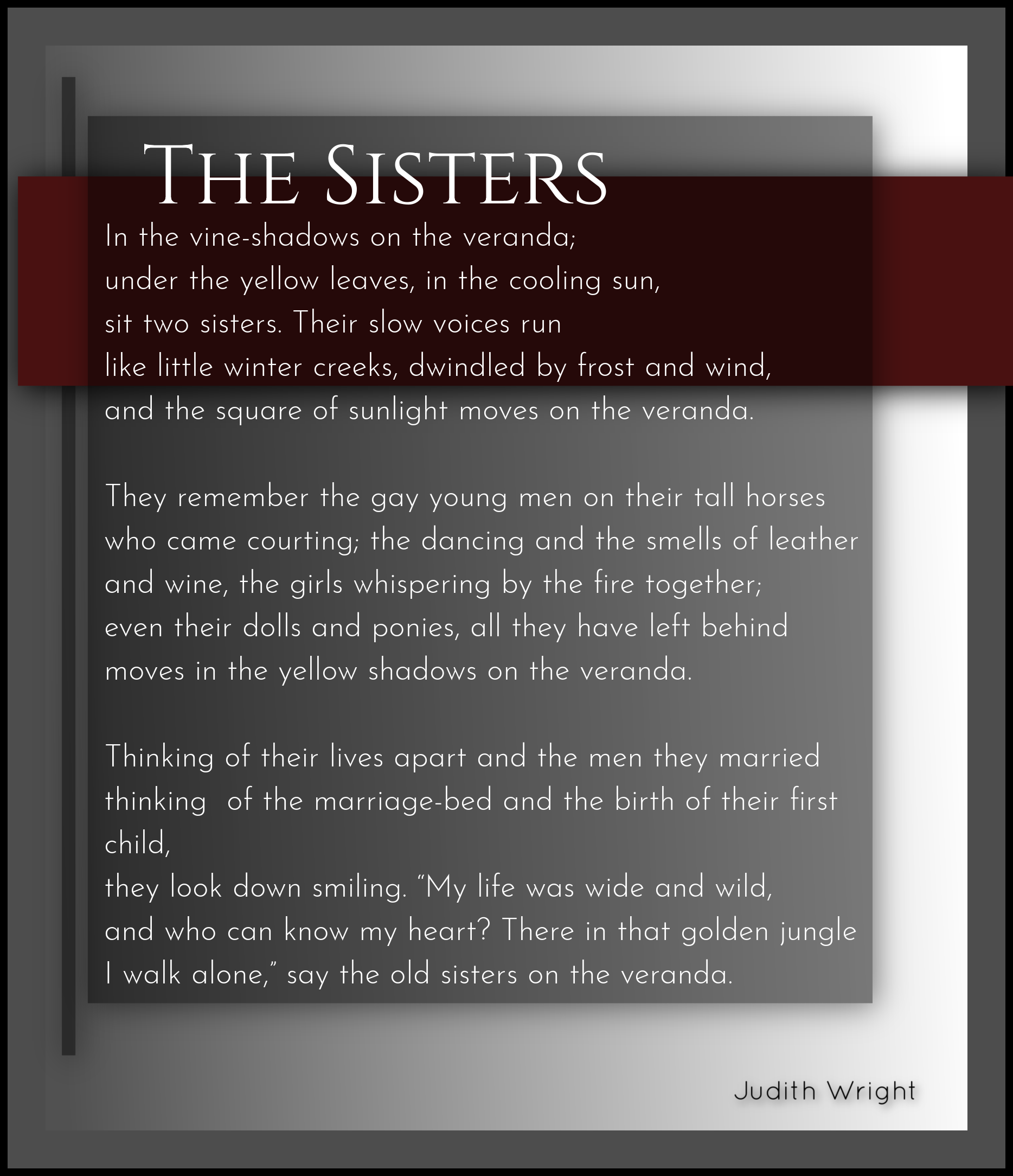
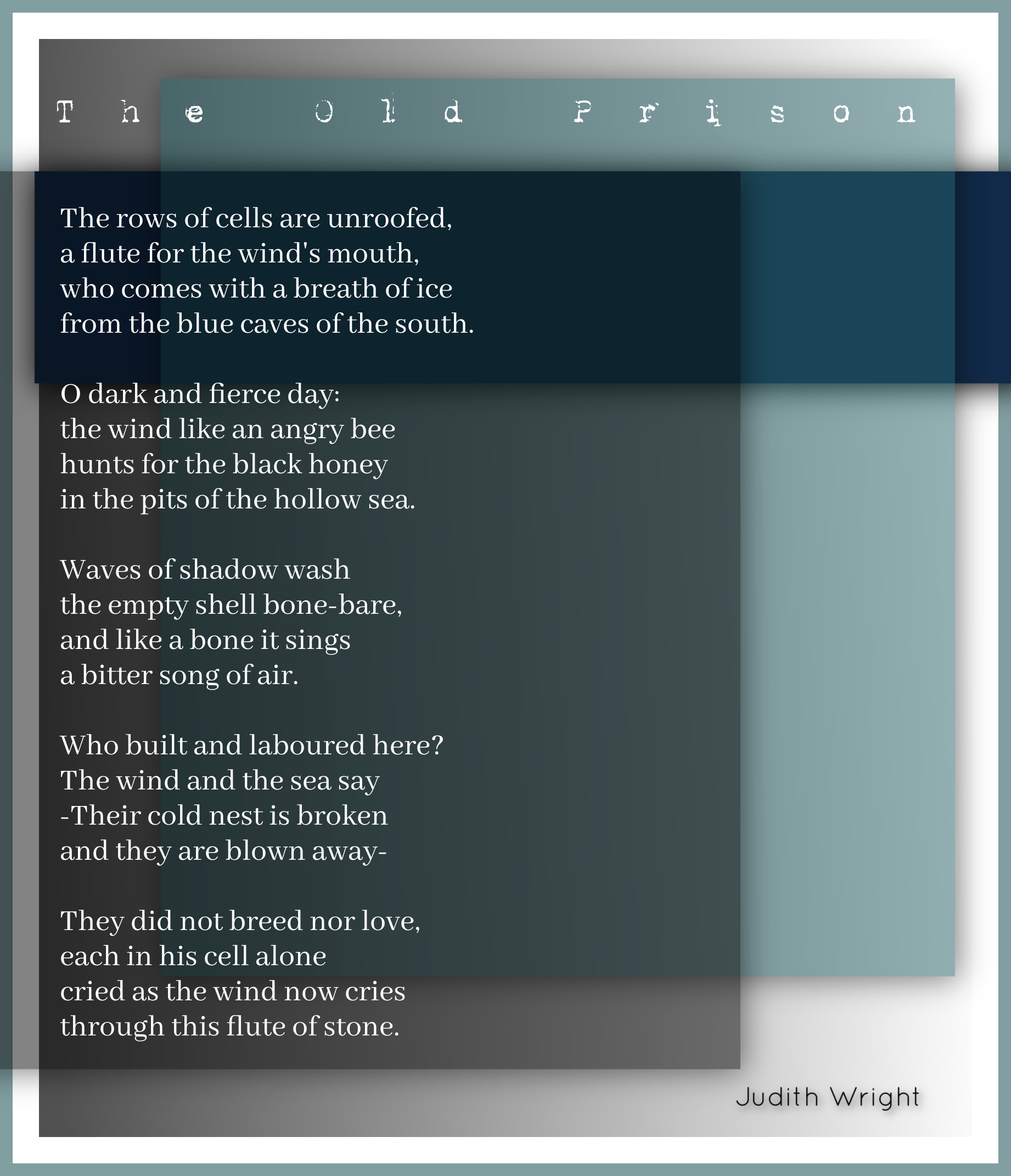
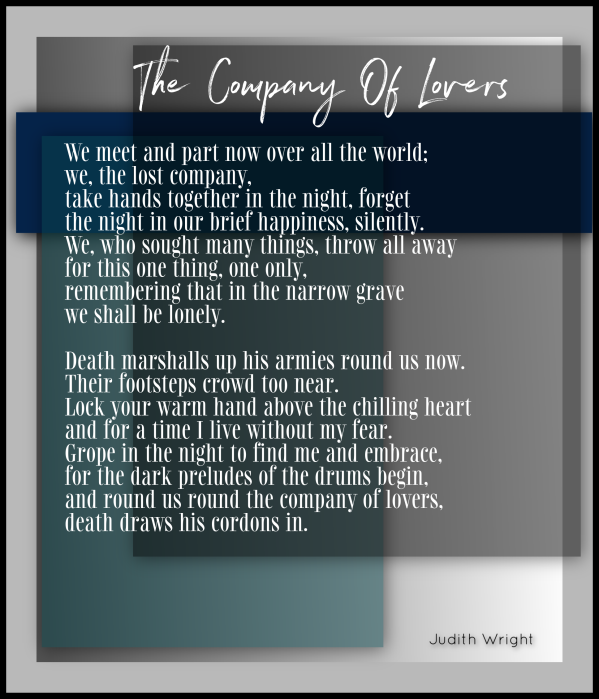
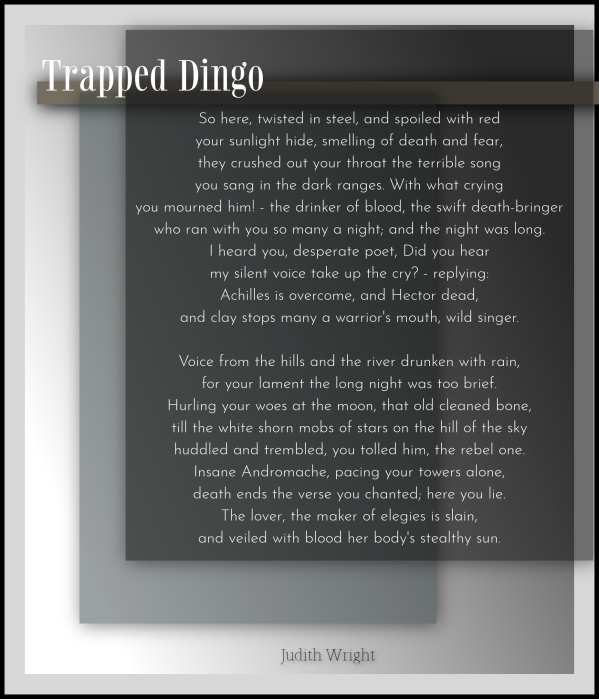
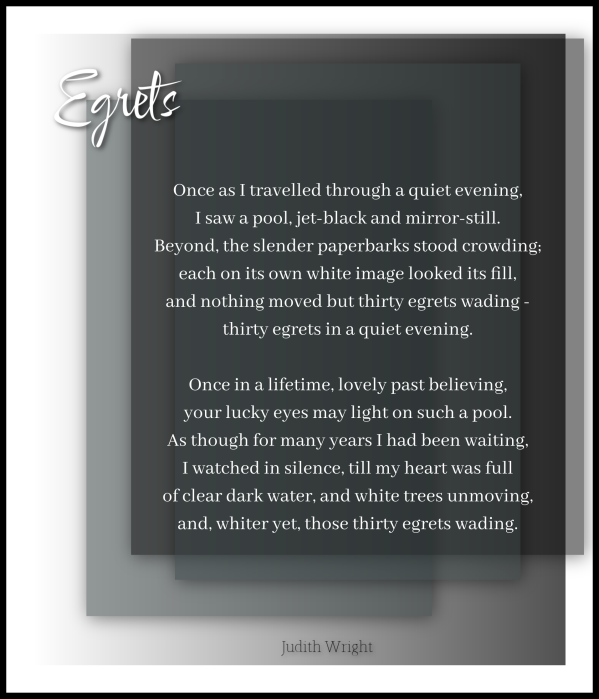
Legend
The blacksmith's boy went out with a rifle
and a black dog running behind.
Cobwebs snatched at his feet,
rivers hindered him,
thorn branches caught at his eyes to make him blind
and the sky turned into an unlucky opal,
but he didn't mind.
I can break branches, I can swim rivers, I can stare
out
any spider I meet,
said he to his dog and his rifle.
The blacksmith's boy went over the paddocks
with his old black hat on his head.
Mountains jumped in his way,
rocks rolled down on him,
and the old crow cried, You'll soon be dead.
And the rain came down like mattocks.
But he only said,
I can climb mountains, I can dodge rocks,
I can shoot an old crow any day,
and he went on over the paddocks.
When he came to the end of the day, the sun began falling,
Up came the night ready to swallow him,
like the barrel of a gun,
like an old black hat,
like a black dog hungry to follow him.
Then the pigeon, the magpie and the dove began wailing
and the grass lay down to pillow him.
His rifle broke, his hat blew away and his dog was
gone and the sun was falling.
But in front of the night, the rainbow stood on the mountain,
just as his heart foretold.
He ran like a hare,
he climbed like a fox;
he caught it in his hands, the colours and the cold -
like a bar of ice, like the column of a fountain,
like a ring of gold.
The pigeon, the magpie and the dove flew up to stare,
and the grass stood up again on the mountain.
The blacksmith's boy hung the rainbow on his shoulder
instead of his broken gun.
Lizards ran out to see, snakes made way for him,
and the rainbow shone as brightly as the sun.
All the world said, Nobody is braver, nobody is bolder,
nobody else has done
anything equal to it. He went home as easy as could be
with the swinging rainbow on his shoulder.
Bullocky
Beside his heavy-shouldered team
thirsty with drought and chilled with rain,
he weathered all the striding years
till they ran widdershins in his brain:
Till the long solitary tracks
etched deeper with each lurching load
were populous before his eyes,
and fiends and angels used his road.
All the long straining journey grew
a mad apocalyptic dream,
and he old Moses, and the slaves
his suffering and stubborn team.
Then in his evening camp beneath
the half-light pillars of the trees
he filled the steepled cone of night
with shouted prayers and prophecies.
While past the campfire's crimson ring
the star struck darkness cupped him round.
and centuries of cattle-bells
rang with their sweet uneasy sound.
Grass is across the wagon-tracks,
and plough strikes bone beneath the grass,
and vineyards cover all the slopes
where the dead teams were used to pass.
O vine, grow close upon that bone
and hold it with your rooted hand.
The prophet Moses feeds the grape,
and fruitful is the Promised Land.
Naked Girl And Mirror
This is not I. I had no body once-
only what served my need to laugh and run
and stare at stars and tentatively dance
on the fringe of foam and wave and sand and sun.
Eyes loved, hands reached for me, but I was gone
on my own currents, quicksilver, thistledown.
Can I be trapped at last in that soft face?
I stare at you in fear, dark brimming eyes.
Why do you watch me with that immoderate plea-
"Look under these curled lashes, recognize
that you were always here; know me-be me."
Smooth once-hermaphrodite shoulders, too tenderly
your long slope runs, above those sudden shy
curves furred with light that spring below your space.
No, I have been betrayed. If I had known
that this girl waited between a year and a year,
I'd not have chosen her bough to dance upon.
Betrayed, by that little darkness here, and here
this swelling softness and that frightened stare
from eyes I will not answer; shut out here
from my own self, by its new body's grace-
for I am betrayed by someone lovely. Yes,
I see you are lovely, hateful naked girl.
Your lips in the mirror tremble as I refuse
to know or claim you. Let me go-let me be gone.
You are half of some other who may never come.
Why should I tend you? You are not my own;
you seek that other—he will be your home.
Yet I pity your eyes in the mirror, misted with tears;
I lean to your kiss. I must serve you; I will obey.
Some day we may love. I may miss your going, some day,
though I shall always resent your dumb and fruitful years.
Your lovers shall learn better, and bitterly too,
if their arrogance dares to think I am part of you.
The Killer
The day was clear as fire,
the birds sang frail as glass,
when thirsty I came to the creek
and fell by its side in the grass.
My breast on the bright moss
and shower-embroidered weeds,
my lips to the live water
I saw him turn in the reeds.
Black horror sprang from the dark
in a violent birth,
and through its cloth of grass
I felt the clutch of earth.
O beat him into the ground.
O strike him till he dies-
or else your life itself
drains through those colourless eyes.
I struck again and again
Slender in black and red
he lies, and his icy glance
turns outward clear and dead.
But nimble my enemy
as water is, or wind.
He has slipped from his death aside
and vanished into my mind
He has vanished whence he came,
my nimble enemy;
and the ants come out to the snake
and drink at his shallow eye.
South Of My Days
South of my days' circle, part of my blood's country,
rises that tableland, high delicate outline
of bony slopes wincing under the winter,
low trees, blue-leaved and olive, outcropping granite-
clean, lean, hungry country. The creek's leaf-silenced,
willow choked, the slope a tangle of medlar and crabapple
branching over and under, blotched with a green lichen;
and the old cottage lurches in for shelter.
O cold the black-frost night. The walls draw in to the warmth
and the old roof cracks its joints; the slung kettle
hisses a leak on the fire. Hardly to be believed that
summer will turn up again some day in a wave of rambler-roses,
thrust it's hot face in here to tell another yarn-
a story old Dan can spin into a blanket against the winter.
Seventy years of stories he clutches round his bones.
Seventy years are hived in him like old honey.
Droving that year, Charleville to the Hunter,
nineteen-one it was, and the drought beginning;
sixty head left at the McIntyre, the mud round them
hardened like iron; and the yellow boy died
in the sulky ahead with the gear, but the horse went on,
stopped at Sandy Camp and waited in the evening.
It was the flies we seen first, swarming like bees.
Came to the Hunter, three hundred head of a thousand-
cruel to keep them alive - and the river was dust.
Or mustering up in the Bogongs in the autumn
when the blizzards came early. Brought them down; we
brought them down, what aren't there yet. Or driving for Cobb's on the run
up from Tamworth-Thunderbolt at the top of Hungry Hill,
and I give him a wink. I wouldn't wait long, Fred,
not if I was you. The troopers are just behind,
coming for that job at the Hillgrove. He went like a luny,
him on his big black horse.
Oh, they slide and they vanish
as he shuffles the years like a pack of conjuror's cards.
True or not, it's all the same; and the frost on the roof
cracks like a whip, and the back-log break into ash.
Wake, old man. This is winter, and the yarns are over.
No-one is listening
South of my days' circle
I know it dark against the stars, the high lean country
full of old stories that still go walking in my sleep.
Late Spring
The moon drained white by day
lifts from the hill
where the old pear-tree fallen in storm
springs up in blossom still.
Women believe in the moon:
this branch I hold
is not more white and still than she
whose flower is ages old,
and so I carry home
flowers from the pear
that makes such obstinate tokens still
for fruit it cannot bear.
Request To A Year
If the year is meditating a suitable gift,
I should like it to be the attitude
of my great- great- grandmother,
legendary devotee of the arts,
who having eight children
and little opportunity for painting pictures,
sat one day on a high rock
beside a river in Switzerland
and from a difficult distance viewed
her second son, balanced on a small ice flow,
drift down the current toward a waterfall
that struck rock bottom eighty feet below,
while her second daughter, impeded,
no doubt, by the petticoats of the day,
stretched out a last-hope alpenstock
(which luckily later caught him on his way).
Nothing, it was evident, could be done;
And with the artist's isolating eye
My great-great-grandmother hastily sketched the scene.
The sketch survives to prove the story by.
Year, if you have no Mother's day present planned,
Reach back and bring me the firmness of her hand.
All things conspire
All things conspire to hold me from you –
even my love,
since that would mask you and unname you
till merely woman and man we live.
All men wear arms against the rebel –
and they are wise,
since the sound world they know and stable
is eaten away by lovers’ eyes.
All things conspire to stand between us –
even you and I,
who still command us, still unjoin us,
and drive us forward till we die.
Not till those fiery ghosts are laid
shall we be one.
Till then, they whet our double blade
and use the turning world for stone.
The Trains
Tunnelling through the night, the trains pass
in a splendour of power, with a sound like thunder
shaking the orchards, waking
the young from a dream, scattering like glass
the old mens' sleep, laying
a black trail over the still bloom of the orchards;
the trains go north with guns.
Strange primitive piece of flesh, the heart laid quiet
hearing their cry pierce through its thin-walled cave
recalls the forgotten tiger,
and leaps awake in its old panic riot;
and how shall mind be sober,
since blood's red thread still binds us fast in history?
Tiger, you walk through all our past and future,
troubling the children's sleep'; laying
a reeking trail across our dreams of orchards.
Racing on iron errands, the trains go by,
and over the white acres of our orchards
hurl their wild summoning cry, their animal cry….
the trains go north with guns.
To a Child
When I was a child I saw
a burning bird in a tree.
I see became I am,
I am became I see.
In winter dawns of frost
the lamp swung in my hand.
The battered moon on the slope
lay like a dune of sand;
and in the trap at my feet
the rabbit leapt and prayed,
weeping blood, and crouched
when the light shone on the blade.
The sudden sun lit up
the webs from wire to wire;
the white webs, the white dew,
blazed with a holy fire.
Flame of light in the dew,
flame of blood on the bush
answered the whirling sun
and the voice of the early thrush.
I think of this for you.
I would not have you believe
the world is empty of truth
or that men must grieve,
but hear the song of the martyrs
out of a bush of fire-
"All is consumed with love;
all is renewed with desire."
Drought Year
That time of drought the embered air
burned to the roots of timber and grass.
The crackling lime-scrub would not bear
and Mooni Creek was sand that year.
The dingo's cry was strange to hear.
I heard the dingoes cry
in the scrub on the Thirty-mile Dry.
I saw the wedgetail take his fill
perching on the seething skull.
I saw the eel wither where he curled
in the last blood-drop of a spent world.
I heard the bone whisper in the hide
of the big red horse that lay where he died.
Prop that horse up, make him stand,
hoofs turned down in the bitter sand
make him stand at the gate of the Thirty-mile Dry.
Turn this way and you will die-
and strange and loud was the dingoes' cry.
Northern River
When summer days grow harsh
my thoughts return to my river,
fed by white mountain springs,
beloved of the shy bird, the bellbird,
whose cry is like falling water.
O nighted with the green vine,
lit with the rock-lilies,
the river speaks in the silence,
and my heart will also be quiet.
Where your valley grows wide in the plains
they have felled the trees, wild river.
Your course they have checked, and altered
your sweet Alcaic metre.
Not the grey kangaroo, deer-eyes, timorous,
will come to your pools at dawn;
but, their tamed and humbled herds
will muddy the watering places.
Passing their roads and cities
you will not escape unsoiled.
But where, grown old and weary,
stagnant among the mangroves,
you hope no longer – there on a sudden
with a shock like joy, beats up
the cold clean pulse of the tide,
the touch of sea in greeting;
the sea that encompasses
all sorrow and delight
and holds the memories
of every stream and river.
Magpies
Along the road the magpies walk
with hands in pockets, left and right.
They tilt their heads, and stroll and talk.
In their well-fitted black and white.
They look like certain gentlemen
who seem most nonchalant and wise
until their meal is served — and then
what clashing beaks, what greedy eyes!
But not one man that I have heard
throws back his head in such a song
of grace and praise — no man nor bird.
Their greed is brief; their joy is long.
For each is born with such a throat
as thanks his God with every note.
|
|





















